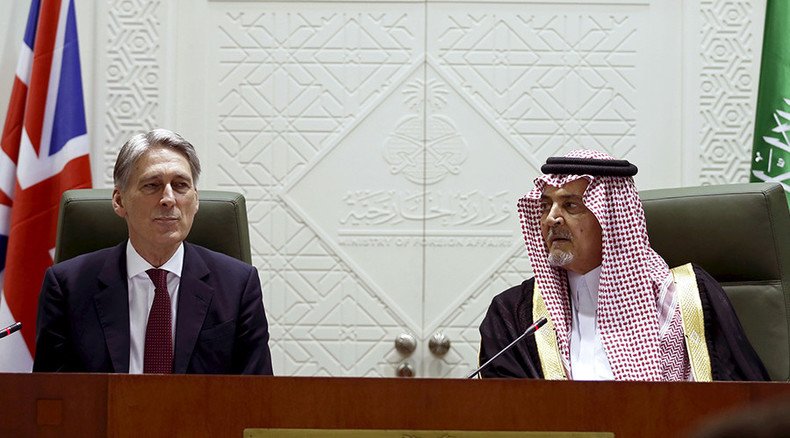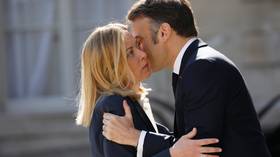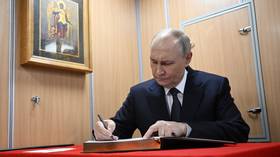WikiLeaks cables implicate UK & Saudi Arabia in secret deal to secure UNHRC seats

Two years after the controversial appointment of Saudi Arabia, one of the world’s leading human rights offenders, to the UN human rights council, Wikileaks cables have revealed a “secret deal” suggesting that the British government was a key player behind Riyadh's nomination.
Some of the 61,000 files from the Saudi Foreign Ministry, dated January and February 2013, translated by both UN Watch and newspaper, The Australian, reveal that the two countries reached a secret deal to ensure that they would both be elected to the Human Rights Council (UNHRC) in 2013, despite Saudi Arabia’s horrific human rights record.
There many additional #Saudi#UNHRC vote-swapping / "payment" schemes detailed in WikiLeaks Saudi-cables https://t.co/RsleSyCc5Q
— WikiLeaks (@wikileaks) September 30, 2015One of the secret cables, obtained by Wikileaks in June, said: “The ministry might find it an opportunity to exchange support with the United Kingdom, where the Kingdom of Saudi Arabia would support the candidacy of the United Kingdom to the membership of the council for the period 2014-2015 in exchange for the support of the United Kingdom to the candidacy of the Kingdom of Saudi Arabia.”
Another diplomatic wire stipulated that there was a price tag for being on board the influential UN body: One cable revealed that Saudi Arabia transferred $100,000 for “expenditures resulting from the campaign to nominate the Kingdom for membership of the human rights council.”
While the Saudi regime has already managed to execute some 135 people so far this year, the country’s record in 2013 was almost as bad, putting it among the top five countries in terms of the number of executions carried out that year.
Amnesty International counted a minimum of 79 executions in 2013, with foreigners accounting for “almost half” of them. At least three people were executed for crimes they allegedly committed when they were under 18 years of age.
Saudi Arabia’s criminal justice system is based on hardline Shariah law and diverges from the secular interpretation of human rights and law enshrined in UNHRC.
Saudi Arabia wins UN Human Rights Council post. Some ppl aren't too happy. The 1-min video: https://t.co/dfvUotKqe1pic.twitter.com/GtsziTdbod
— Hillel Neuer (@HillelNeuer) September 24, 2015In Saudi Arabia the death penalty can be imposed for a wide range of offenses besides murder, including rape, false prophecy, blasphemy, witchcraft and sorcery. The death penalties are carried out publicly and can be implemented by beheading, firing squad, stoning, and sometimes crucifixion.
Currently Riyadh has come under intense heat for sentencing Ali Mohammed al-Nimr to death by crucifixion, a sentence that was handed down when he was 17, following several days of torture while in custody.
READ MORE: Op Nimr: Anonymous targets Saudi websites as teen awaits crucifixion for ‘anti-govt activities’
The WikiLeaks revelations about the secret London-Riyadh trading raise new concerns over the sincerity of Western nations in their claims that they fight for and defend human rights.
“If the UK is doing back-room deals with Saudi officials over human rights, this would be a slap in the face for those beleaguered Saudi activists who already struggle with endemic persecution in the kingdom,” Allan Hogarth from Amnesty International UK told the Guardian.
“The UK should be supporting the rights of [those persecuted], not pushing the non-existing human rights credentials of the Saudi Arabian authorities,” he added.
“Based on the evidence, we remain deeply concerned that the UK may have contracted to elect the world’s most misogynistic regime as a world judge of human rights,” Hillel Neuer, executive director of UN Watch, told the Australian.
In the meantime the Foreign Office told The Australian that it was “standard practice” not to reveal voting intentions or record, a claim that UN Watch denies.
“The claim of the Foreign Office that concealing a country’s UN vote is a ‘standard practice’ with ‘all members’ is manifestly false,” Neuer said.
The director says that it is “troubling” that London refuses to deny the vote-trade deal. The NGO is also furious that the Foreign Office is unable to reassure the public that London’s voting practices comply with the principles of UNHRC, which tries to elect member states based on their human rights record.
The 2013 secret vote deal went a long way and has spurred a recent wave of criticism, as this summer, Faisal bin Hassan Trad, Saudi Arabia’s envoy to the UN, was appointed to chair a UN Human Rights Council team.
READ MORE: ‘False legitimacy’: Saudi Arabia hosting UN Human Rights Council slammed by watchdog
The appointment is seen as scandalous as, according to Human Rights Watch, only China and Iran have executed more people this year than Saudi Arabia.
In fact, the HRW, in its latest report on Saudi Arabia, accuses the monarchy of “systematic discrimination” against women and religious minorities while subjecting hundreds of people to unfair trials and arbitrary detention. The NGO also spoke out against anti-terrorism regulations introduces in 2014 used to criminalize “almost any form of peaceful criticism of the authorities as terrorism.”
LISTEN MORE:













